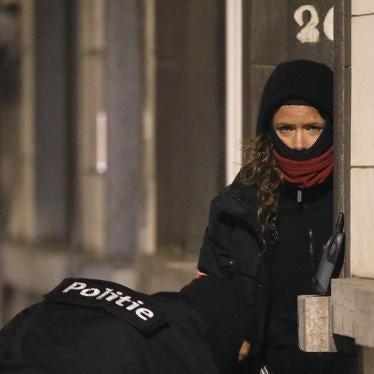One month after the worst terrorist attack in Europe since Anders Breivik’s murder of 77 people in Norway, the contours of the response are becoming clear. Three areas stand out – new counterterrorism laws and policies; the related, though distinct, efforts to curb radicalisation and recruitment into terrorism, and a focus on tackling rising anti-Semitism.
While each area is legitimate, an examination of the details reveals troubling patterns and problematic gaps. To make these responses truly effective and consistent with human rights, more work and reflection is needed.
Even before the Paris attacks, the rise of the extremist group Islamic State, also known as ISIS, had prompted many European governments to introduce new security powers. France adopted new legislation in November to block its citizens from leaving the country to fight for ISIS, and stiffened the penalties for speech that “glorifies” terrorism. Germany has prosecuted about 300 of its citizens for supporting ISIS or trying to fight abroad and is considering new powers to confiscate IDs of those it suspects may do the same (it already confiscates passports).
The UK parliament is finalizing review of a bill introduced in October that would block UK citizens who fight abroad from returning home for up to two years, and since May 2014 has had the power to strip citizenship from dual nationals it suspects of terrorism even if it leaves them stateless. The Netherlands, Norway and Denmark are also planning to make it easier to strip citizenship from dual nationals suspected of terrorism, and Belgium recently joined the list.
France and the UK have suggested broadening their deep and wide surveillance powers. And EU interior ministers want to introduce border checks to screen for terrorism suspects inside the Schengen free-movement area, an issue likely to be discussed at a February 12 informal EU summit on the fight against terrorism.
In crafting these responses, European governments often pay lip service to the need to respect human rights and the rule of law. But the measures frequently raise serious human rights concerns and lack sufficient safeguards. Stripping citizenship should be a last resort, carried out only by a court based on open evidence, and should never result in statelessness. Surveillance powers need greater regulation, not limitless expansion. Countries should refrain from prosecuting speech unless it incites violence. And the rule of law means that everyone should be treated equally.
Terrorism is a tactic of the weak. Its power lies primarily in its ability to provoke a strategic over-reaction by governments in ways that undermine rights and the rule of law. Hasty departures from core values play into the hands of those who attack us, since abusive measures undermine the willingness of the very communities whose cooperation is needed to combat terrorism.
Given the home-grown nature of the Paris attacks, it is natural for policymakers to focus on preventing radicalization and recruitment. There is also growing reflection in France and elsewhere on the link between a lack of integration, social exclusion and vulnerability to radicalization.
Prime Minister Manuel Valls of France went so far as to describe the exclusion experienced by the predominantly black and Arab French citizens living in its blighted suburbs as “apartheid.”
Ensuring an appropriate response to the issue is as important as identifying it. On that front the signs are less than encouraging. Leaders in the UK and France are falling back on familiar approaches, seeing integration largely as a one-way process. The emphasis is on requiring Muslim leaders to condemn terrorism and instruct their fellow Muslim citizens to embrace mainstream values, a process to be reinforced with compulsory instruction in schools.
There may be a place for such approaches, provided they are firewalled from the activities of the police and security services. But young people are not estranged from the state and society because of a lack of citizenship classes or because of sermons at Friday prayers. The reasons are far more complex, and include elements such as foreign policy that may be difficult to address. But the state can take positive steps to combat discrimination against Muslims and minorities, including halting ethnic profiling by the police. Avoiding abusive counterterrorism measures that appear to target Muslims or other groups is important.
The bloody siege at a kosher supermarket in Paris woke many up to the disturbing rise of anti-Semitic violence in Europe. In the past year, this has included the shootings at the Jewish museum in Brussels, a spike in incidents in the UK, France and Germany and a growing exodus of Jews from Europe to Israel motivated at least in part by fear of violence. European policymakers are right to respond forcefully to this trend, including providing security for Jewish buildings, bringing to justice those who carry out attacks and publicly condemning anti-Semitism in all its forms.
But since rising intolerance in Europe is not confined to anti-Semitism, Europe’s response also needs to be broader. In 2014 and early 2015 there have been serious Islamaphobic attacks in the UK, France, Germany and Sweden, and significant anti-Islam protests in Germany. Roma experience persistent discrimination throughout Europe. And migrants face attack in Greece, Bulgaria, Italy and elsewhere. European governments have largely shied away from these issues, in part because the groups targeted are often perceived as unpopular, while the motives of the aggressors may have a populist appeal. That needs to change too. The German chancellor’s strong words about Islam’s place in Germany offer a way forward. Bringing attackers to justice is also vital.
The head of Europol recently observed that it is impossible to stop all terrorist attacks. That is all the more reason to ensure that Europe’s efforts to prevent them are consistent with our core values.







